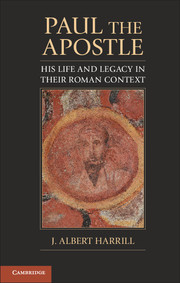Book contents
- Frontmatter
- Contents
- Figures and Boxes
- Preface
- Introduction
- PART I The Life
- PART II The Legend
- Appendix 1: Extant Writings Attributed to Saint Paul in Rough Chronological Order
- Appendix 2: Reconstructing Paul's Corinthian Correspondence: A Puzzle
- Appendix 3: Ancient Christian Works Containing Pauline Traditions and Legends
- Notes and Further Reading
- Bibliography
- Index of Biblical Citations
- Index
Appendix 3: Ancient Christian Works Containing Pauline Traditions and Legends
Published online by Cambridge University Press: 05 November 2012
- Frontmatter
- Contents
- Figures and Boxes
- Preface
- Introduction
- PART I The Life
- PART II The Legend
- Appendix 1: Extant Writings Attributed to Saint Paul in Rough Chronological Order
- Appendix 2: Reconstructing Paul's Corinthian Correspondence: A Puzzle
- Appendix 3: Ancient Christian Works Containing Pauline Traditions and Legends
- Notes and Further Reading
- Bibliography
- Index of Biblical Citations
- Index
Summary
The Acts of the Apostles, in the New Testament (8–28), ca. 95–115. From the same author of the Gospel of Luke, this highly theological narrative presents Paul as the greatest hero of a “unified” Church, who brings the gospel from its origins in Jerusalem to the imperial capital of Rome, with powerful orations, great miracles, and dramatic travels as God's “chosen instrument” (Acts 9:15), the historical reliability of which is disputed among modern scholars. Historical claims about Paul (and Christian origins) should, therefore, be drawn from Acts only with great caution.
The Epistle of James (2:14–26), in the New Testament, ca. late first century. The pseudonymous letter's particular contrast of faith and works, which echoes Paul's own terminology, points to a literary relationship with a corpus of Paul's letters. Discussed in Mitchell 2007.
Clement of Rome, First Letter of Clement to the Corinthians (5.1–7; 47), ca. 96. Written by Clement, a Christian leader in Rome, to the church at Corinth, this letter is the earliest attestation of Paul's epistles outside of the New Testament writings. It rebukes certain youthful factions for refusing to give respect to church elders (bishops and deacons), suggesting that conflicts within the Corinthian congregation continued well after Paul's death. It venerates the apostle as a “herald of both East and West,” a reference to Paul's plan in Romans for a Spanish mission. Translated in Ehrman 2003, vol. 2, 43–45, 119–20. . . .
- Type
- Chapter
- Information
- Paul the ApostleHis Life and Legacy in their Roman Context, pp. 171 - 176Publisher: Cambridge University PressPrint publication year: 2012



